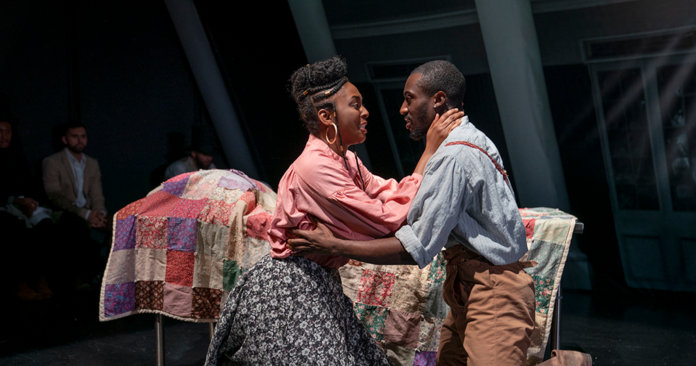aD sPOT
Jody Christopherson
Curated From newyorktheatrereview.blogspot.com Check Them Out For More Content.
It’s still got it.
Its been over 10 years since Southern Promises graced a New York stage. A lot has changed since Thomas Bradshaw’s play shocked and provoked audiences back in 2008. Since then there has been a slew of slave plays. It’s almost a sub-genre in and of itself that has given American theatre some of its most provocative plays in the last decade. Octaroon, Slave Play, Father Comes Home From the War, Sugar in Our Wounds, Pure Confidence, and I could name about 10-15 more prominent plays that seek to examine a particular angle of slavery or to turn the practice on its head. Southern Promises started off this wave and I was wondering if it would stand the test of time and continue to shock people. I was thinking these things on a Saturday night performance as EMT workers carted out an audience member who fainted.
After all these years Southern Promises confirmed what fans and critics of Bradshaw’s work have accused of doing…and I think that’s exactly the point. On the surface, Southern Promises is a simple emancipation story. A slave owner dies and makes a promise to sets his slaves free. His wife Elizabeth, played by a frightening and cold-blooded Brittany Zaken, tries to stop the emancipation while engaging in savage rape with enslaved Benjamin. Benjamin is married to Charlotte, who also gets raped by Elizabeth’s brother, David. Eventually the slaves are set free, only to face the complex outside world as damaged people. The title of the play is ironic, sad, twisted. What is the promise? Yes, it’s emancipation. But emancipation to do what? To move out west and kill Native Americans for the government? To become a wealthy land owner who treats the help like he was once treated, and repeat the cycle re-enslavement? The options were limited back then for a free black man and they are limited now. Exploit or get exploited: is that the real promise? Bradshaw leaves it as an open-ended question.
The story twists with the contradiction, lies, and rationalizations of the characters. Everyone does shocking things that muddy their declared values. Passions take precedent over the intellect, and it’s shocking, disconcerting. The actors sparkle, shock, delight. Shakur Tolliver captures the fear and trauma of Benjamin with clarity. Yvonne Jessica Pruitt continues to shine in recent productions, and this play is no exception. Director Niegel Smith and Bradshaw teamed up to rewrite the ending and it left me wanting more…which is probably the point. The direction and design are on point with Scenic Designer Jason Sherwood using an enormous flat picture of a plantation house that is titled forward like we are in a surreal nightmare.
And then the guy sitting at the end of my row passed out. Now I have no idea if he was shocked out of his mind or if he just ate some bad fish. But I found the shocking reaction fitting and on-brand with Bradshaw’s brand.
Now gather round children because I’m going to tell you a story. Back in the aughts of 2000, it was a rare feat for Black playwrights to get a world premiere in the big city. When they were produced, it was usually something palatable and self-congratulatory for white audiences. Back in those pioneer, pre-smart phone days, I was grinding away writing experimental Black projects, aka unproduced-able ‘desk drawer’ plays while living in South Park Slope. Thomas Bradshaw lived a few blocks down from me and he was writing his own weird, dangerous, strange plays that made people uncomfortable. We started up a group called “Emerging Black Playwrights” for all the weirdo, afro-Punk Black artists who were outside the boundaries of good taste. The group lasted for about a year. We invited the industry to our presentation which were usually met with horror, disgust, and confusion. Thomas and I felt pretty good about ourselves. We were ‘punk’ or as punk as you could be in theatre. We were disgusting the ‘right people,’ but it didn’t really make for a successful career path. The group dissolved as Bradshaw put up his play Strom Thurmond is Not a Racist. I saw it and the next day a prominent white male sought me out. He asked me what I thought of Bradshaw’s work, but I could see it wasn’t an innocent question. After all this critic didn’t ask me what I thought about Chekhov or Shakespeare or the hundreds of new plays we both saw together by white writers. For the first time, he wanted my opinion as if it would make a difference to his perspective. He was probing me –as a black artist- to see if I would confirm his confusion or anger. Instead I said his confusion at Bradshaw’s work was EXACTLY the point. You should be confused. The work exists uniquely on its own, whether you love or hate it. I didn’t chastise him nor did I give him a free pass to slam another artist of color doing something different. I merely pointed out that perhaps your discomfort isn’t a system glitch, but an intentional feature. This critic went on his merry way and has never asked me my opinion about anything again.
STROM THURMOND blew up and so did subsequent Bradshaw productions. Then the backlash started, which was expected. Bradshaw’s work highlights people of all races who do the despicable and inexplicable. There is no judgment from the writer. Punishment for the wicked rarely happens. Brutal violence, rape, rampant drug use and alcoholism populate the stage. The ‘matter of fact’ way in which these acts are being presented tends to upset people. The horror happens with the lights up, no soundtrack, no monologue. It’s indicative of an outlook on life that our time here is short and full of hypocrisy and violence.
Personally I don’t look at Bradshaw’s work with a sense of glee. That’s not the right feeling when I see the simulation of rape, whipping, and drug use. The sense I get is punk, two-middle fingers in the air toward any political or theatrical etiquette. The affect on me is sobering. There are no fanciful bourgeoisie narratives that are opiates for the masses. His tales tend to be brief, brutal, silly, sad, and overflowing with contradictions…like life.
SOUTHERN PROMISES
by Thomas Bradshaw
directed by Niegel Smith
Featuring The Bats
Darby Davis
Brittany Zaken
Shakur Tolliver
Yvonne Jessica Pruitt
Jahsiah Rivera
Marcus Jones
Timothy Park
Adrain Washington
Selamawit Worku
Adam Coy
Ana Semedo
Lambert Tamin
Scenic Designer-Jason Sherwood
Costume Designer- Claudia Brown
Lighting Designer-Jorge Arroyo
Sound Designer- Fabian Obispo
Project Designer – Jess Medenbach
Hair/Makeup Designer – Nikiya Mathis (?!?)
Violence/Intimacy Choreographer – Rocio Mendez
Assistant Director – Tyler Thomas
March 11 – April 18th
The Flea
20 Thomas Street
New York, NY. 10007
Aurin Squire is a playwright, reporter, and tv writer from South Florida. He is a New Dramatists resident playwright, as well as a member of the Dramatists Guild of America and the Writers Guild of America. In 2017 he won the Helen Merrill Prize for Emerging Writers and was nominated by the WGA for his TV work. His plays have been produced in New York, London, Los Angeles, and Chicago. His play FIRE SEASON was an Emerald Prize winner and received its world premiere at Seattle Public Theatre in January 2019. CONFESSIONS OF A COCAINE COWBOY world premieres in March 2019 at Miami New Drama, and he has two commissions for new plays in the 2020 season. In TV, Squire was a staff writer on the CBS political comedy BRAIN DEAD and story editor on the NBC drama THIS IS US. Currently, he is a co-producer on the CBS legal drama THE GOOD FIGHT. He graduated from The Juilliard School and Northwestern University.a
Aurin Squire is a playwright, reporter, and tv writer from South Florida. He is a New Dramatists resident playwright, as well as a member of the Dramatists Guild of America and the Writers Guild of America. In 2017 he won the Helen Merrill Prize for Emerging Writers and was nominated by the WGA for his TV work. His plays have been produced in New York, London, Los Angeles, and Chicago. His play FIRE SEASON was an Emerald Prize winner and received its world premiere at Seattle Public Theatre in January 2019. CONFESSIONS OF A COCAINE COWBOY world premieres in March 2019 at Miami New Drama, and he has two commissions for new plays in the 2020 season. In TV, Squire was a staff writer on the CBS political comedy BRAIN DEAD and story editor on the NBC drama THIS IS US. Currently, he is a co-producer on the CBS legal drama THE GOOD FIGHT. He graduated from The Juilliard School and Northwestern University.a
Advertisement


